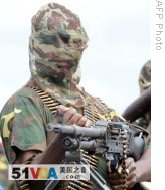Abuja
31 January 2009
 |
| A fighter of the Movement for the Emancipation of the Niger Delta (MEND) holds his heavy machine-gun at the militia's creek camp in the Niger Delta, 17 Sep 2008 |
The Nigerian military, lacking local knowledge and equipment, struggles to avoid ambushes in the vast creeks and mangrove swamps of the Niger Delta, where the populist rhetoric of the militants has won them support.
A Port Harcourt-based Niger Delta analyst, Sofiri Peterside, says while the militants have proved effective in ambushes and surprise attacks, they lack the capacity to engage in full-scale battles with the government military. Doctor Peterside says the militant's decision to resume crippling attacks on security forces and the oil industry is bound to increase tensions in the region.
"I don't see the militants possessing the capacity of engaging the military in a full-scale battle," he said. "On the basis of what has happened in the past, what I'm seeing is that there is likely to be a situation where there will be escalation of violence." "The military may be protecting a particular installation and the militants may decide to change their own operational tactics. There is every likelihood that tensions in the region will escalate. The tendency is that very innocent people may be affected," he added.
The main militant group, the Movement for the Emancipation of the Niger Delta, MEND, which has been holding two British hostages for more than four weeks, declared a ceasefire last September but had repeatedly warned it would resume attacks if provoked.
The group warned the oil industry to prepare for what it called 'Hurricane Obama,' beginning Saturday.
Dr. Peterside says the government has not paid sufficient attention to the humanitarian crises engendered by clashes between security forces and militants in the past.
"The humanitarian tragedies and the humanitarian emergencies which these conflicts have thrown up, have not received the attention of government," he said. "In most cases, children, women and the aged have suffered, communities have been wiped off and no attempt or project to bring relief to these people. So, I suspect, just as it happened in Tombias axis, that innocent people will again be affected and that creates refugee problems, which serious attention has not been paid to."
The Niger Delta conflict has simmered for over a decade. Government crackdowns or offers of peace talks have had little effect on the rebellion. Grievances are rooted in the region's deep poverty and environmental degradation.